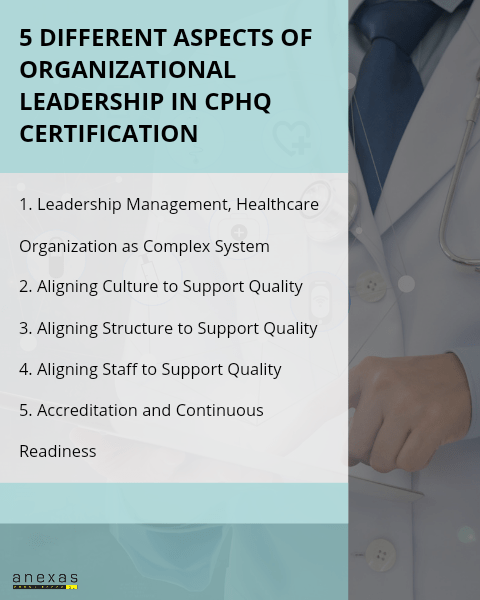CPHQ Certification – Organizational Leadership
CPHQ or Certified Professional of Healthcare Quality is the most prominent certification program for healthcare professionals. CPHQ is one of the most important certifications a person in healthcare can own. It is the only accredited certification in the industry. CPHQ helps in the advancement of medical services quality. It conveys techniques required in leadership, knowledge enhancement, performance management and so forth to develop the productivity and quality of medical care.

Anexas provides a CPHQ training program for individuals as well as organizations to help them certified as Certified Professional of Healthcare Quality under the National Association for Healthcare Quality (NAHQ). Different modules are important to cover the important aspects of the training. One of which is CPHQ Certification- Organization Leadership which is one of the prominent outcomes of the training.
There are a few further contexts that need to be considered which widen the CPHQ Certification- Organizational Leadership in-depth, like Leadership Management, Healthcare Organization as Complex System, Aligning Culture, Structure and Staff to support quality, Accreditation and Continuous Readiness and much more. Below is a detailed explanation of each context of Organizational Leadership.
Let’s see 5 different aspects of Organizational Leadership in CPHQ certification

1. Leadership Management, Healthcare Organization as Complex System:
Healthcare Organizations are one of the pivotal organizations in any country and are responsible for taking care of the vitality of a nation. Albeit a portion of the parts of a healthcare organization might work as a basic framework where mediations would yield the normal outcomes, many pieces of it work as complex frameworks inside the organization. Thus, it is difficult to fully foretell all kinds of changes and mediations in the system. However, this complexity renders a great environment to practice Leadership and is absolutely needed as well to manage everything without any friction. A leader who has strong communication skills, as well as planning skills to run every field of each department smoothly, will make the organization work much more effectively and also reduce costs to a huge extent.
2. Aligning Culture to Support Quality
The maintenance of a good culture is very important in any organization. It plays a fundamental role in aligning the organization and staff in a manner that every member is equally satisfied in their role and is giving their best to the organization. A healthcare organization must have the best culture so that the patients receive the best quality of services from the employees. A few ways to align culture to support quality are having an engaging onboarding process, empowering team-building activities and collaborating with different team members, focalizing employees’ impact on the team and task, focusing on core values, keeping an open window for ideas from any individual, communication amongst top-level management with even the entry-level employees, and many many more possibilities and strategies to benefit the quality of the organization.
3. Aligning Structure to Support Quality
Having a structured organizational hierarchy is very important so that each employee knows their roles and responsibilities. Healthcare organizations require accuracy in the execution of occupation obligations and various layers of responsibility to work. To achieve this, healthcare organizations utilize a useful authoritative construction with many layers of management. Understanding the total healthcare organizational structure guarantees that medical clinic representatives know their own liabilities, the obligations of people around them, to whom they report, and who to converse about specific obligations or fields of information. Starting from the entry-level employees which are Service Providers to the top management level, i.e. the Board of Directors, each has a role to contribute to the betterment of the quality of the organization and is only possible to get the best out of them only if it is aligned perfectly and is apprehensible to each one about their duties.
4. Aligning Staff to Support Quality
The best quality is produced when each member of a team or the organization is well aware of the organization’s core vision and mission. When each personnel knows and understands the values the organization keeps the highest, they can align with the values and work as one body giving the best of the quality. Performance management drives employee behavior to line up with hierarchical objectives and targets. Numerous organizations fail in this kind of alignment leaving representatives befuddled concerning what is generally anticipated of them, bringing about an absence of commitment to organizational objectives and absence of positive results. As representatives create their own guide, there is potential for workers to run into each other’s ways and struggle to develop. It is additionally vital that objectives are aligned to guarantee consistency, gather speed, and diminish struggle between divisions. Without alignment, every office could be centered around their particular objectives to work on authoritative execution, however, could incidentally be neutralizing the endeavors of another division.
5. Accreditation and Continuous Readiness
Accreditation is the process of recognizing institutions officially and being certified as having met a certain standard of quality and performance management. Any healthcare organization having an accreditation automatically stands out from the other lot as they are accredited on the basis of quality and service excellence. Accreditation encourages quality improvement and brings in transparency both in both intra- and inter-departments. Continuous readiness, on the other hand, brings in the initiation of healthcare personnels to maintain a safe healthcare environment. It basically implies having staff at all levels doing the right things for the right reasons since they understood those reasons. These drive the quality to reach as high as it can, and it can be induced in employees in a good leadership environment.
Conclusion
All these contexts are parts of CPHQ certification- Organizational Leadership and are widely used in Healthcare Organizations or are taught to maintain and enhance the quality of organizations. In the training program of CPHQ by Anexas, one will be learning about all of these techniques and tools and many more. CPHQ is a necessity for professionals in the healthcare department and one must not miss out on grabbing an opportunity to learn something new.
Also read: CPHQ Certification – Health Data Analytics





